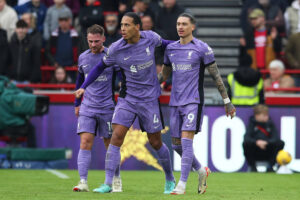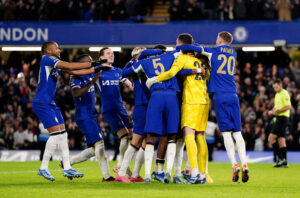A lot has been discussed since the news broke that Saudi Arabia backed Public Investment Fund (PIF) will be the new majority owners of Newcastle United. At the centre of every debate is the moral and ethical quandaries that Saudi Arabia’s investment in the club, through a sovereign wealth fund chaired by Crown Prince Mohammed bin Salman, will bring. Or more specifically, the country’s human rights record towards women and the LGBTQ+ community.
In turn, the reaction from Newcastle’s LGBTQ+ community was always going to draw attention. On 8th October, Newcastle’s LGBTQ+ supporter group, United with Pride, broke their silence on the controversial takeover, stating they support their new owners.
United with Pride Controversially Welcomes Saudi Arabia Investment
The Statement
In a lengthy statement, United with Pride explained why they welcome Saudi Arabia acquiring the club. Read the full statement here.
The main reason revolves around the chance to do something positive in terms of LGBTQ+ rights.
A spokesperson for United with Pride said: “There is potential to be a positive influence to improving the conditions for the LGBTQ+ community in Saudi Arabia and elsewhere. Recently the country relaxed some laws for women, which can be seen as a reflection of international influence.
“Furthermore, the fact that in this investment they have collaborated with Amanda Staveley should indicate they are being influenced by our culture of respect, equality and tolerance.”
After just two days of ownership, United With Pride’s view suggests Saudi Arabia are already seeing sports washing success – the process of cleaning your reputation through sport. Just a brief analysis of their reaction can show why.
LGBTQ+ Rights
First, it must be said that fans should not be held accountable for the actions of their owners. It is unfair. But, they can be accountable for supporting narratives that are entirely separate from reality.
The starkest display of this from United with Pride is underplaying the Kingdom’s view on LGBTQ+. They are not just one of the “least tolerant” of the communities’ rights, but Saudi Arabia does not recognise LGBTQ+ rights at all. They do not exist.
It is a criminal offence that is punishable by fines, public whipping, chemical castrations, life imprisonment and capital punishment if you are a member of the LGBTQ+ in the Kingdom of Saudi Arabia (KSA).
In November 2019, two male Saudi journalists sought asylum in Australia. However, they were detained in the Pacific due to the Kingdom’s security services chasing them and revealing their sexuality.
In another example, Human Rights Watch said a Yemeni was fined, jailed in solitary confinement for six weeks and deported to Yemen for supporting equal rights. Mohamad al-Bokari’s health deteriorated rapidly and needed hospital treatment as a result of living conditions in his cell. After his trial, he was called “devil worshipper” by other prisoners.
United with Pride goes on to say they will use Manchester City as a shining example of how to base their relationship with the club. While they are not exactly role models, there is good reason for them to insert it in their statement.
In June, Canal Street Blues were emotional after Manchester City published a pro-pride video. Gestures like that, which are so rare, can go along. They change taboos, as the Blues chairman says, in the UK.
That is all well and good, but the UK does not matter in this instance. It is about those discriminated against in the UAE and Saudi Arabia.
Like the KSA, the United Arab of Emirates deems homosexuality and transgender a criminal offence. Unsurprisingly, they deem it immoral and unethical. In 2020, the director of a Bollywood gay film said the UAE banned it from being shown in the country.
This is why there is little point for United with Pride to compare their head-in-the-sand attitude to another. Little is actually done in the grand scheme of things.
If the UAE have failed to change their stance on LGBTQ+ after 13 years of City ownership, there should be little expectation for Saudi Arabi to follow suit.
When the Rainbow Laces campaign returns, the hypocrisy will be there for all to see.
Saudi Arabia’s Vision 30
Saudi Arabia’s ‘Vision 30’ is an economic and social plan aimed to reform the country in numerous ways. One branch is to boost its sport and entertainment. For example, hosting boxing matches, Formula One races or owning a high-esteemed football club.
On the surface, it is understandable why some may believe ‘Vision 30’ to be an opportunity to teach Saudi Arabia how to “treat” minority groups.
Nonetheless, Human Rights Watch decisively labelled the programme as ‘whitewashing’. They say it gave the KSA the space to escape criticism while the world plauded their plans. Some of their actions included detaining activists, opponents, royal family members and their role in the Yemen conflict.
“Saudi-led coalition has since 2015 bombed homes, markets, schools, hospitals, and mosques in unlawful attacks that have killed hundreds of civilians, some of which may amount to war crimes,” Human Right Watch reported in October 2020.
Women’s Rights
United with Pride are right about one point: women’s rights have grown in Saudi Arabia. For example, they were granted the right to drive, and enter sports and entertainment venues in 2018.
However, women’s rights are still a major issue in Saudi Arabia. Attitudes towards women are strict. They must ensure their behaviour and clothes do not affect the men around them, or their male ‘guardian’ (a male relative who needs to accompany them).
A 2019 British Medical Journal study showed women’s rights are also sexually infringed. They estimate of one in five women and girls were subject to Female Genital Mutilation in Saudi Arabia. While the Journal admits information is “limited” as a result of limited national statistics and other reasons, it is a figure that will horrify many.
Working wise, opportunities are opening with more women in education and work, though to only an extent. A 2016 figure put the number of women in work at 22%, in comparison to 78% of men. They can work in most sectors, other than ‘dangerous’ fields like construction. In the political area, after being granted the vote in 2015, women politicians hold just 20 of the 2,000 local council seats available.
With that said, people should be sceptical of the influence of Amanda Shelvey. She has been the front person of this deal because she is the perfect face for the consortium to plant the belief the KSA will drastically change their women’s rights. In other words, she is a PR tool.
Shelvey’s role is now to guide Newcastle through a transformation, on-the-pitch and off-the-pitch. She will look towards new signings and improving St James’ Park.
It is doubtful her to-do list includes lobbying the Crown Prince on the phone, demanding greater women rights and ruffling Saudi conservative circles.
If the view is held, then Saudi’s sports washing is already proving to be effective.
Main Photo






